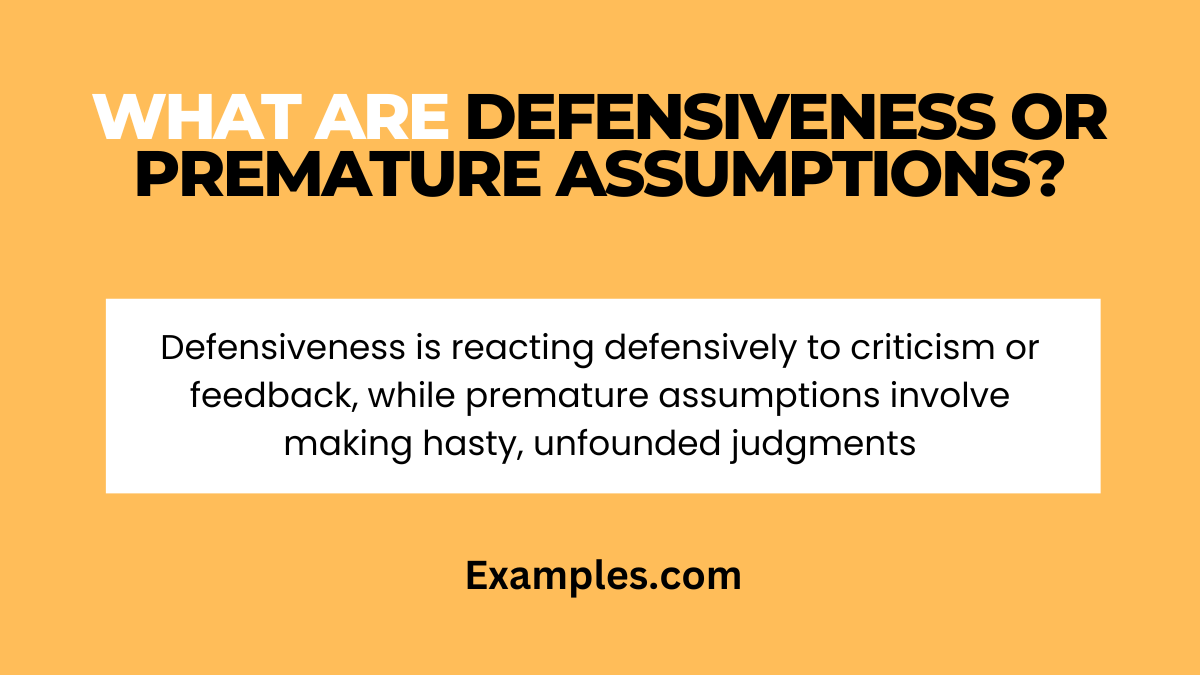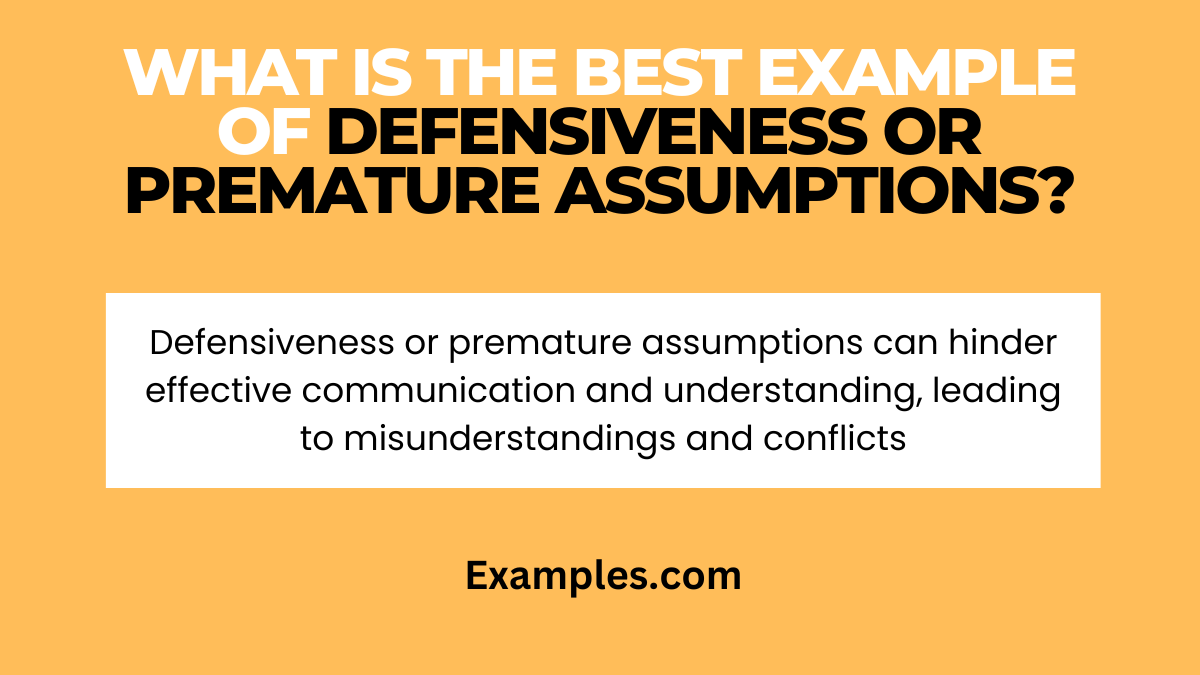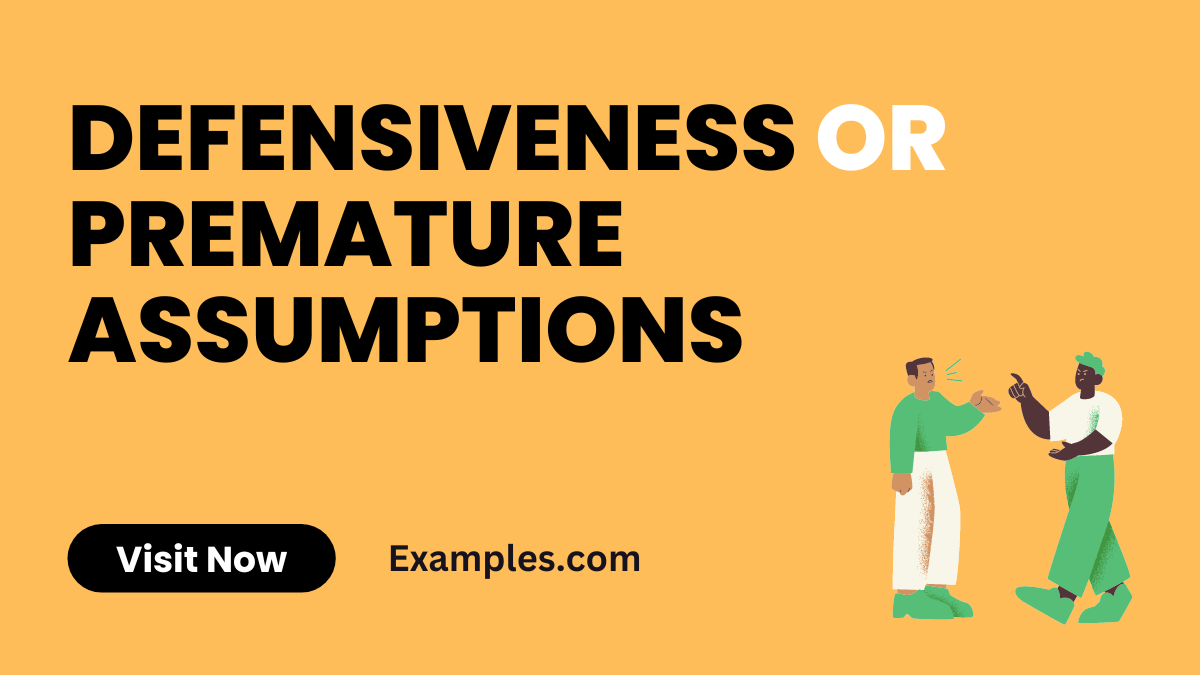Defensiveness or Premature Assumptions
Defensiveness or premature assumptions can be significant roadblocks in effective communication. This guide delves into understanding these barriers, offering insights on recognizing and overcoming them. By exploring strategies to counteract defensiveness and avoid making hasty assumptions, readers can enhance their interpersonal skills, leading to more fruitful and less conflict-driven conversations. This comprehensive resource is designed to transform your communication approach, enabling more open, empathetic, and productive exchanges.
What are Defensiveness or Premature Assumptions?

Defensiveness and premature assumptions are common yet often overlooked communication barriers. Defensiveness arises when individuals feel attacked or threatened, leading to protective responses that hinder open dialogue. Premature assumptions, on the other hand, involve forming opinions or conclusions without adequate information, often based on biases or misconceptions. These elements can significantly distort the quality of interactions, leading to misunderstandings and conflicts.
What is the Best Example of Defensiveness or Premature Assumptions?

A classic example of defensiveness is when someone immediately reacts negatively to constructive feedback, interpreting it as personal criticism rather than an opportunity for growth. In terms of premature assumptions, imagine someone interpreting a colleague’s quiet demeanor during a meeting as disinterest, without considering other factors like their natural introversion or perhaps they’re processing information internally.
20 Examples of Defensiveness or Premature Assumptions
Defensiveness or Premature Assumptions refer to the tendency to react protectively or negatively in anticipation of criticism or negative feedback, often leading to communication barriers. These reactions can stem from past experiences, insecurities, or misinterpretations, hindering open and effective communication. Understanding and recognizing these behaviors is crucial in personal and professional interactions to foster constructive dialogues and relationships.
- “You never listen to me!” – This assumption prevents open dialogue, assuming the other party is always uninterested.
- “I know you’re going to disagree, but…” – Presuming disagreement sets a defensive tone for the conversation.
- “You always think I’m wrong!” – This statement projects a defensive stance, assuming criticism from the other person.
- “I’m not even going to try explaining because you won’t understand.” – Pre-judging the listener’s comprehension or interest creates a barrier.
- “You’re just saying that because you’re biased.” – Accusing someone of bias without evidence blocks healthy communication.
- “No point in telling you, you’ve made up your mind.” – Assuming inflexibility in others can shut down meaningful exchanges.
- “I bet you’re going to blame me again.” – Preemptive defensiveness can escalate tensions unnecessarily.
- “You always take their side.” – This assumption can lead to feelings of alienation and defensiveness.
- “You wouldn’t understand because you’ve never experienced it.” – Presuming someone’s incapacity for empathy limits perspective sharing.
- “There’s no use explaining, you’re going to find faults anyway.” – Predicting negative feedback can inhibit open communication.
- “I know you think my ideas are stupid.” – Anticipating ridicule can prevent someone from sharing valuable thoughts.
- “You’re going to disagree, but hear me out.” – Starting a conversation with a defensive stance sets a negative tone.
- “You never take my suggestions seriously.” – This assumption undermines the possibility of constructive dialogue.
- “I won’t bother, you’re too set in your ways.” – Presuming rigidity in others stifles the exchange of new ideas.
- “It’s not like you care about my opinion.” – Assuming disinterest can prevent open and honest communication.
- “You just want to find fault in what I say.” – This mindset creates a barrier to receiving constructive feedback.
- “I’m not talking about this; you won’t understand.” – Avoiding discussion based on assumptions hinders problem-solving.
- “Why bother? You’ve already decided I’m wrong.” – Such a stance can lead to missed opportunities for clarification.
- “You’re always so critical of my work.” – This generalization can lead to a defensive interaction.
- “There’s no point; you’re going to ignore my input anyway.” – Presuming neglect or dismissal can damage collaborative efforts.
Defensiveness or Premature Assumptions in Relationships
- Emotional Reactions: In relationships, defensiveness often stems from emotional reactions. A partner might interpret a comment as criticism and respond defensively, even if the intent was benign. This reaction can escalate misunderstandings and create a hostile environment.
- Misinterpretation of Intentions: Partners may assume negative intentions behind their partner’s words or actions, leading to premature assumptions. This can create a cycle of mistrust and miscommunication.
- Lack of Active Listening: Defensive behavior often arises when one partner does not actively listen to the other. Instead of trying to understand, they prepare their defense, leading to further miscommunication.
- Impact on Conflict Resolution: Defensiveness hampers effective conflict resolution. It creates a barrier to acknowledging issues and working towards a solution, often resulting in unresolved conflicts.
- Erosion of Trust: Continuous defensiveness erodes trust in a relationship. It signals that one partner is not open to feedback, making it difficult to build a strong, trusting relationship.
Defensiveness or Premature Assumptions Psychology
- Self-Protection Mechanism: Psychologically, defensiveness is a self-protection mechanism. It is often a response to perceived threats to one’s self-esteem or self-concept.
- Rooted in Insecurities: These behaviors are frequently rooted in personal insecurities or past traumas. Individuals may perceive attacks where none are intended due to these unresolved issues.
- Impact on Self-Perception: Constant defensiveness can negatively impact an individual’s self-perception, as it reinforces a mindset of being under threat, affecting mental well-being.
- Barrier to Personal Growth: Defensive behavior can be a significant barrier to personal growth and self-awareness, as it prevents individuals from openly receiving constructive criticism or feedback.
- Communication Patterns: Psychologically, this behavior often signifies entrenched communication patterns that may need professional intervention to alter, such as therapy or counseling.
Defensiveness or Premature Assumptions in Business
- Impact on Team Dynamics: In a business setting, defensiveness can significantly impact team dynamics. It can create an environment of blame and distrust, inhibiting effective teamwork.
- Barrier to Feedback Culture: A defensive attitude in the workplace can stifle a culture of constructive feedback, which is crucial for continuous improvement and innovation.
- Effect on Decision-Making: Premature assumptions can lead to flawed decision-making, as they may be based on incomplete or biased information rather than objective analysis.
- Leadership Challenges: Defensive behavior in leaders can create a disconnect with their teams, making it difficult to inspire trust and loyalty among team members.
- Customer Relations: In customer-facing roles, defensiveness can damage relationships with clients, as it may be perceived as unprofessional or unaccommodating.
Defensiveness and premature assumptions is vital for effective communication. By following the provided guide and tips, you can navigate these communication barriers with skill and empathy. Remember to stay open-minded, actively listen, and seek clarification to foster more constructive and harmonious interactions in both personal and professional relationships.



